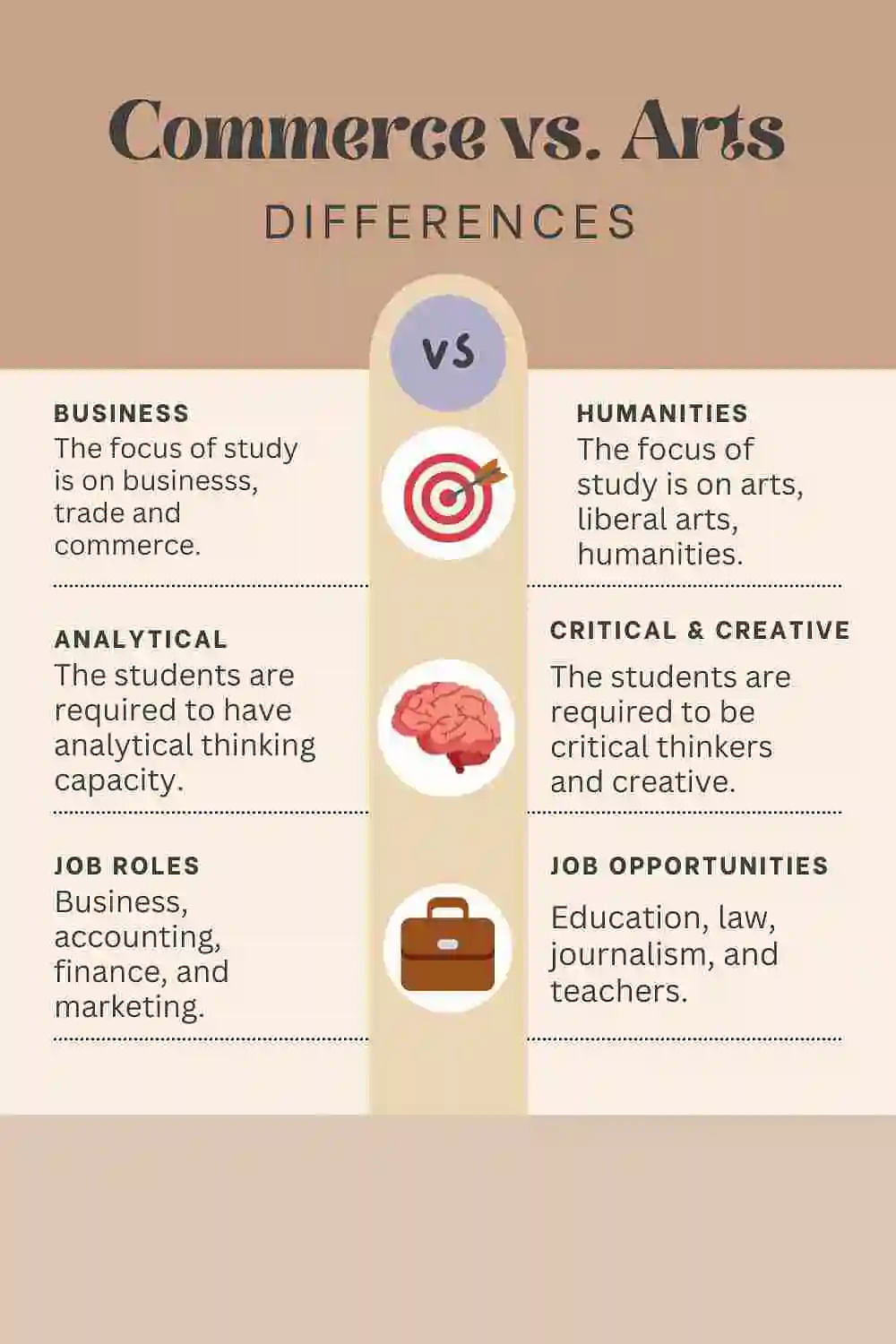Students interested in business and accounts can pursue commerce, while those interested in humanities can pursue arts. Students from the commerce field can become entrepreneurs, accountants, or marketers. At the same time, aspirants from the arts can become lawyers, journalists, and teachers.
Table of Contents
Commerce vs arts can be tough, as both courses guarantee a promising future. Commerce is a course designed to understand business, whereas the Arts is a course that deals with humanity. Students who want to establish a career in finance or business must pursue commerce.
What is Commerce?
A commerce courses focuses on building and developing the practices of business. It concentrates on areas such as accounting, economics, business studies, and finance.
Candidates can choose this course after the 10th. Commerce course is also available at UG and PG levels. It will help them to understand the subject and prepare themselves for the world.
What is Art?
An arts courses deals with subjects like humanities, social sciences, and creative arts. The course can be pursued at UG, PG, and doctoral levels.
Arts courses are a good choice for students, and it develop critical thinking, communication, and problem-solving skills that are essential for success in any field.
Commerce vs Arts: Similarities
There are a few similarities between commerce and arts, such as both courses have excellent job opportunities. Some of the other similarities are as follows:
- Both commerce and arts develop the critical thinking ability of the students.
- Further, both of these courses integrate students to dive into in-depth research.
- One common subject for both the courses is economics.
- Moreover, both courses focus on the quantitative skills of the students.
Commerce vs Arts: Difference

Commerce is more mathematical-oriented, and arts is critical thinking. The commerce vs arts differences are as follows:
| Particulars | Commerce | Arts |
| Focuses | Business | Humanity |
| Skills | Analytical | Critical thinking and creative |
| Careers | Business, accounting, finance, and marketing. | Education, law, journalism, and teachers. |
Commerce vs Arts: Subjects
The list of subjects for commerce vs arts has only one commonality, that is economics. The list of subjects is as follows:
| Commerce | Arts |
| Accountancy | History |
| Business Studies | Economics |
| Economics | Geography |
| English | Political Science |
| Informatics Practices/ Mathematics | English |
| Physical Education (Optional) | Psychology |
| Sociology | |
| Philosophy | |
| Home Science | |
| Physical Education |
Commerce vs Arts: Top Colleges
Many colleges offer commerce and arts courses. However, the selection of the college will depend on the choice of students and distance. Here are some of the top colleges:
| Top Colleges for Commerce | Top Colleges for Arts |
| Shri Ram College of Commerce (SRCC), New Delhi | JNU |
| Lady Shriram College (LSC), New Delhi | BHU |
| Parul University, Vadodra | CU |
| Loyola College, Chennai | Jadavpur University |
| Chandigarh University, Mohali | Anna University |
| St Xavier's College (SXC), Kolkata | Delhi University |
| NIMS University, Jaipur | Jamia Milia University |
| Christ University, Bangalore | CU |
Commerce vs Arts: Careers
There are various career options after commerce and arts. The list of top career opportunities for commerce vs arts is as follows:
| Commerce | Arts |
| Accountant | Writer |
| Auditor | Designer |
| Financial Analyst | Lawyer |
| Investment Banker | Social worker |
| Marketing Manager | Psychologist |
| Sales Executive | Teacher |
| HR Executive | Professor |
| HR Manager | Journalist |
| Enterprenuer | Reporter |
| Management Consultant | Sculptor |
Commerce vs Arts: Which is better?
The debate of which is better, commerce vs arts, is never-ending. Commerce is for students who want a career in trading and business. Arts is for students who wish to pursue a career in teaching, social worker, writers, and humanities.
However, here are some pointers that can help the candidates choose between commerce and arts:
- Choice of Subjects: Students who are interested in accounts, economics, and business must opt for commerce. Students interested in English, history, geography, political science, and humanities must choose arts.
- Interests: Students must also foresee their interests. If they are interested in the ideas of business, they must choose commerce. Suppose finer things drive them and appreciate art forms must choose arts.
- Skills: Students must possess some knowledge in maths and accounting to pursue commerce. However, it is suggested that they choose maths as an optional subject as it will broaden their career aspect in commerce. Students must possess writing and critical thinking abilities to pursue a career in arts.
- Careers: Both commerce and arts offer promising futures. Students get ample opportunity to establish themselves.
Benefits of Studying Commerce
Commerce is a subject that opens doors to various career opportunities. Some of the advantages of studying commerce are as follows:
- Great Career Options: Commerce graduates can pursue careers in business, accounting, finance, marketing, and more.
- Distinguished Prospect of Salary: Commerce graduates earn higher salaries than graduates of other streams. Financial bankers, accountants, or investment bankers earn 8 to 15 LPA.
- Entrepreneurial Knacks: The graduates from the commerce field learn about entrepreneurship. They can start their own business if they want.
- Inter-Personal Skills: Commerce students are usually good at managing budgets, saving, and investing. These skills can help them to make sound financial decisions throughout their lives.
Benefits of Studying Arts
Arts is a creative course, and students develop critical thinking abilities. Some of the benefits of studying arts are as follows:
- Creative: Arts students are capable of expressing their thoughts through words. They can unearth the underlying meaning of something.
- Enhanced Power-Solving Skills: Arts graduates can employ their aptitude and reasoning skills to resolve any complex problems. They can be naturally creative and innovative.
- Excellent Careers: Arts students naturally tend to harbour teaching skills. Besides, they can work as professionals in media, teachers in schools or colleges, writers, and more. The salary of each of these fields ranges between 3 to 8 LPA.
- Developed Communicative Power: The arts teach students how to communicate effectively and to collaborate with others.
The choice of courses depends on the students. They can also lend help from any academic counsellor if they face difficulty in selecting their career.


























POST YOUR COMMENT